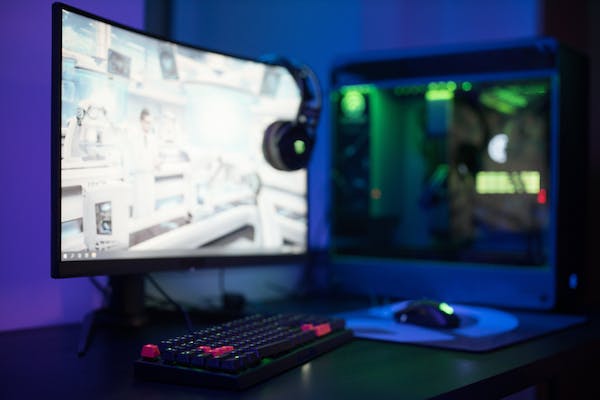Building a Budget-Friendly Gaming PC: Unleash the Power without Breaking the Bank
by siteadmin

Gaming has become an increasingly popular hobby, with an abundance of high-quality titles available for PC enthusiasts. However, building a gaming PC can be an expensive endeavor, often deterring those on a tight budget. But fear not! In this article, we'll guide you through the process of building a cheap gaming PC that delivers impressive performance without emptying your wallet.
Define Your Gaming Needs:
Before diving into the components, it's crucial to establish your gaming requirements. Determine the types of games you'll be playing, their system requirements, and the desired graphics settings. This will help you prioritize the components that are most important for your gaming experience.
Research and Compare:
With a defined set of requirements, conduct thorough research on different components available in the market. Look for options that offer a balance between performance and cost-effectiveness. Compare prices, read reviews, and check user feedback to make informed decisions.
Processor (CPU) Selection:
For a budget gaming PC, consider mid-range processors from reputable brands. AMD Ryzen processors often offer excellent value for money, providing a solid foundation for gaming. Aim for a quad-core or hexa-core processor with decent clock speeds to handle modern games effectively.
Graphics Card (GPU) Considerations:
The graphics card is crucial for a gaming PC's performance. While top-of-the-line GPUs can be expensive, there are budget-friendly options available. Look for mid-range graphics cards such as NVIDIA GeForce GTX or AMD Radeon RX series, which provide a good balance of price and performance.
Memory (RAM) and Storage:
When it comes to RAM, opt for at least 8GB, preferably 16GB, for smooth gaming performance. In terms of storage, consider a combination of a solid-state drive (SSD) for faster boot times and loading speeds, along with a larger capacity hard disk drive (HDD) for storing games.
Motherboard and Power Supply:
Select a motherboard that is compatible with your chosen processor and has sufficient expansion slots for future upgrades. Look for a reliable power supply unit (PSU) with enough wattage to accommodate your components comfortably.
Case and Cooling:
Choose a budget-friendly PC case that provides adequate airflow and cable management options. Effective cooling is crucial to prevent overheating and ensure optimal performance. Consider additional fans or budget-friendly aftermarket coolers if necessary.
Peripherals and Accessories:
While building a budget gaming PC, allocate some funds for essential peripherals like a keyboard, mouse, and monitor. Look for reliable options that offer good performance without unnecessary frills. Assembly and Troubleshooting: Once you have gathered all the components, follow detailed guides or video tutorials to assemble your gaming PC. Take your time and be meticulous during the process. In case of any issues, refer to troubleshooting guides or seek help from online communities.
Software and Optimization:
After assembling your gaming PC, install the operating system and necessary drivers. Optimize the system by updating drivers, adjusting graphics settings, and tweaking performance options for an optimal gaming experience.
Building a cheap gaming PC doesn't mean compromising on performance. By doing thorough research, making informed component choices, and optimizing your system, you can achieve impressive gaming capabilities without straining your budget. With the right approach and attention to detail, you'll be ready to embark on exciting gaming adventures without breaking the bank.
As technology continues to advance at a rapid pace, it's essential to periodically refresh your PC hardware to keep up with the demands of modern applications and ensure optimal performance. Whether you're experiencing sluggishness, encountering compatibility issues, or simply want to take advantage of the latest features, a hardware refresh can breathe new life into your computer. In this article, we'll explore the benefits of a PC hardware refresh and guide you through the process of upgrading key components.
A PC hardware refresh is an excellent way to revitalize your computer and unleash its full potential. By upgrading key components such as the CPU, GPU, RAM, and storage, you can experience significant improvements in performance, responsiveness, and overall user experience. With careful planning, compatibility checks, and proper installation, you can breathe new life into your computer and enjoy the benefits of modern technology. So, assess your needs, research the latest hardware, and embark on your PC hardware refresh journey today.
https://pchardwarerefresh.com.au/
Gaming has become an increasingly popular hobby, with an abundance of high-quality titles available for PC enthusiasts. However, building a gaming PC can be an expensive endeavor, often deterring those on a tight budget. But fear not! In this article, we'll guide you through the process of building a cheap gaming PC that delivers impressive…
Recent Posts
- Dr. Anne Berkeley PLLC – Leading the Way in Naturopathic and Functional Medicine in Washington, DC
- Selkirk Energy Solutions: Leading the Charge in Insulation Services in Bonners Ferry and Sandpoint
- Arizona’s Top Climbing and Fitness Destination is Alta Climbing & Fitness
- Kings Commercial Roofing LLC: Montana’s Premier Roofing Company Elevates Roofing Services in Missoula and Beyond
- Kings Commercial Roofing LLC: Montana’s Premier Roofing Company Elevates Roofing Services in Missoula and Beyond
